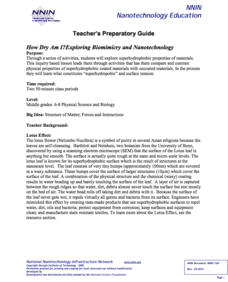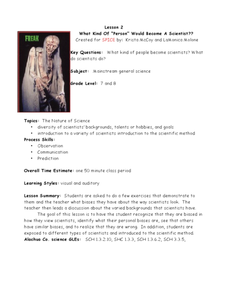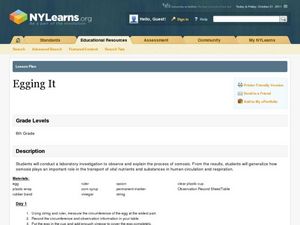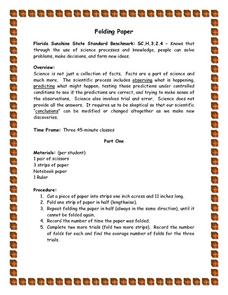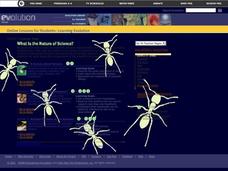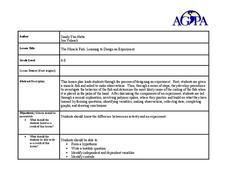Howard Hughes Medical Institute
Winogradsky Columns: Microbial Ecology in the Classroom
Winogradsky columns are ideal for observing the role of bacteria and other microorganisms in an ecosystem. This student activity guide is complete with data tables for observations and analysis questions for processing what was observed....
Science Friday
Sublime Sublimation
Dry ice isn't dehydrated water, and young scientists learn why in this fascinating presentation. After watching a video, they complete three different activities using dry ice. Upon completion, they discuss the scientific principle.
Curated OER
Reptiles and Amphibians
Introduce your class to various reptiles and amphibians. They will meet and identify a representative from each of the four major reptile families, then learn about and discuss reptile characteristics. Next, they will identify and...
Kenan Fellows
The Effects of Environmental Conditions on Aquatic Organisms
What kind of experiment can your class do to how observe the environment effects on organisms? Groups design and conduct lab experiments to learn about the effects of the environment on aquatic organisms. Based upon knowledge gained from...
University of Kentucky
The Great Spider Debate
Poor, misunderstood spiders! They are feared, disrespected, and detested by many people, yet they do so many positive things. A great addition to any insect unit, learn about some of the more common spiders, while hopefully dispelling...
NASA
Moon Phases and Eclipses
Starry-eyed astronomers draw different views of the Moon in order to introduce its phases. Then they experiment with a ball and a lamp to recreate the phases. A demonstration ensures every pupil understands the process, and the...
University of Minnesota
Beautiful Brain: Step Inside the Brain
Before digital microscopes, scientists hired artists to draw the things visible in the microscope. Through training in neuroscience and art, Cajal revolutionized the way we view the beautiful brain. The third lesson in a series of four...
Virginia Department of Education
Three Types of Rocks
Rock out with the second installment of a five-part series on earth materials and processes. Your budding geologists make observations of given rock samples and posit classification systems for rocks. They then learn about the accepted...
American Chemical Society
The Energy of Evaporation
Do all liquids evaporate at the same rate? Young scientists observe the evaporation rate of three different liquids. They measure the time, the temperature, and the change in energy. After comparing the chemical formulas, scholars...
NASA
Ripening of Fruits and Vegetables
How long do fresh foods last in space at the International Space Station? Which foods perish quicker than others? How can astronauts preserve their foods to make them last longer in space? Young scientists test the rates at which some...
National Nanotechnology Infrastructure Network
How Dry am I? Exploring Biomimicry and Nanotechnology
Help your classes feel like they can walk on water! An engaging inquiry-based activity has young scholars experiment with different surface coatings. They make observations about their properties and how they relate to the surface...
Curated OER
What Kind of "Person" Would Become a Scientist?
"Scientist Stereotypes" could be another name for this lesson! Begin by drawing from middle schoolers' preconceived notions and media portrayal of scientists, and then explain that anyone can be a scientist. Even though there is an...
Curated OER
Frost Depth Study
Students complete activities to study the frost and frost depth. In this frost study lesson, students use frost tubes to study and measure the frost at their school. Students measure the frost in the tube and enter their data online to...
Curated OER
Egging It
Sixth graders discover scientific processes by conducting an experiment in class. In this osmosis lesson, 6th graders utilize eggs, cooking ingredients, string and plastic cups to create an experiment in which they watch the exchange of...
Curated OER
Learning From Leaves: From Observation to Inference
Young scholars examine the adaptation of plants to their environments. They analyze and observe the structure, shape, and internal structure of various leaves, and make inferences about the structures.
Curated OER
Folding Paper
Learners use the scientific process and their knowledge to obeserve, predict, and test their predictions under controlled conditions to verify their predictions and then make sense of these predictions. They also graph, write...
Curated OER
Condensation
Students participate in the scientific process to investigate what happens to water when it evaporates by observing condensation. In small groups they observe what happens to ice in a cup, and what occurs when they hold a bowl of ice...
Curated OER
What is the Nature of Science?
Students examine videos of field researach to discover the components of the scientific process. Using forms, they conduct community surveys about the nature of science. They research the extinction of dinosaurs and compare...
Curated OER
Ancient Farmers of the Amazon
High schoolers read a sample research proposal and create their own. They discover the type of information needed for others to reject or accept the proposal. They practice applying the scientific process to different situations.
Curated OER
A Comparison of Polymeric Liquids with Newtonian Liquids
Students concretely illustrate and define a macromolecule, observe the unique behavior of polymers and relate to their knowledge of molecules, and use the scientific process to determine the difference between Newtonian and non-Newtonian...
Curated OER
Introduction To Fractals: an Inquiry
Students evaluate a playful case study about a dog searching for fetching sticks to identify the steps in the science inquiry method. They read the case study and fill in a worksheet with the examples of questions, observations and...
Curated OER
Don't Just Do It - Talk About It!
Students investigate a scientific problem while documenting their research with a video camera. For this scientific method lesson, students hypothesize over a science question and conduct an investigation to find an answer. Students...
Curated OER
Sensational Slime
Students predict, observe and draw conclusions while working on an experiment with "slime." Students accurately record observations and draw conclusions about the experiment.
Curated OER
The Miracle Fish: Learning to Design an Experiment
Students develop procedures to explore the behavior of fish. In this scientific experiment lesson plan students from a hypothesis, write a question, identify different variables and controls in their experiment.












